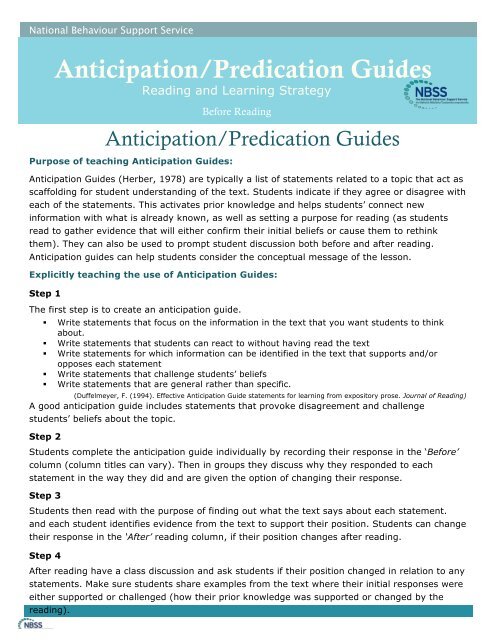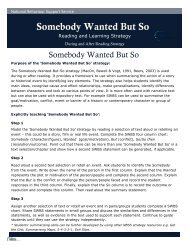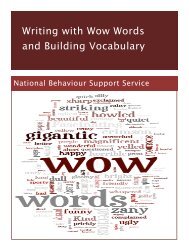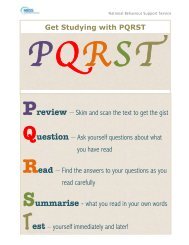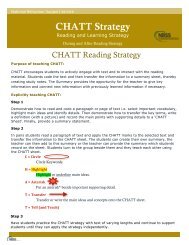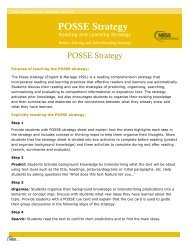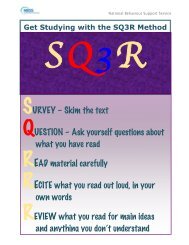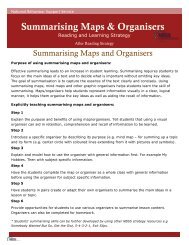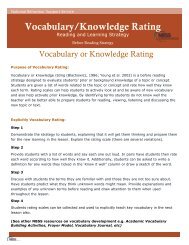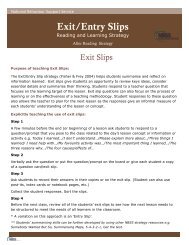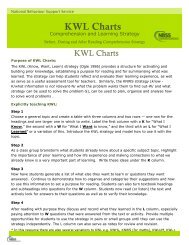View/Download PDF - NBSS
View/Download PDF - NBSS
View/Download PDF - NBSS
Create successful ePaper yourself
Turn your PDF publications into a flip-book with our unique Google optimized e-Paper software.
National Behaviour Support Service<br />
Anticipation/Predication Guides<br />
Anticipation/Predication Guides<br />
Purpose of teaching Anticipation Guides:<br />
Anticipation Guides (Herber, 1978) are typically a list of statements related to a topic that act as<br />
scaffolding for student understanding of the text. Students indicate if they agree or disagree with<br />
each of the statements. This activates prior knowledge and helps students’ connect new<br />
information with what is already known, as well as setting a purpose for reading (as students<br />
read to gather evidence that will either confirm their initial beliefs or cause them to rethink<br />
them). They can also be used to prompt student discussion both before and after reading.<br />
Anticipation guides can help students consider the conceptual message of the lesson.<br />
Explicitly teaching the use of Anticipation Guides:<br />
Step 1<br />
The first step is to create an anticipation guide.<br />
<br />
<br />
<br />
<br />
<br />
Write statements that focus on the information in the text that you want students to think<br />
about.<br />
Write statements that students can react to without having read the text<br />
Write statements for which information can be identified in the text that supports and/or<br />
opposes each statement<br />
Write statements that challenge students’ beliefs<br />
Write statements that are general rather than specific.<br />
(Duffelmeyer, F. (1994). Effective Anticipation Guide statements for learning from expository prose. Journal of Reading)<br />
A good anticipation guide includes statements that provoke disagreement and challenge<br />
students’ beliefs about the topic.<br />
Step 2<br />
Students complete the anticipation guide individually by recording their response in the ‘Before’<br />
column (column titles can vary). Then in groups they discuss why they responded to each<br />
statement in the way they did and are given the option of changing their response.<br />
Step 3<br />
Students then read with the purpose of finding out what the text says about each statement.<br />
and each student identifies evidence from the text to support their position. Students can change<br />
their response in the ‘After’ reading column, if their position changes after reading.<br />
Step 4<br />
After reading have a class discussion and ask students if their position changed in relation to any<br />
statements. Make sure students share examples from the text where their initial responses were<br />
either supported or challenged (how their prior knowledge was supported or changed by the<br />
reading).<br />
Reading and Learning Strategy<br />
Before Reading
Strategy – Anticipation/Predication Guides<br />
National Behaviour Support Service<br />
Anticipation/Predication Guide Examples<br />
Prediction Guide – Estimating<br />
Before reading pages xx-xx, place a beside those statements you think will be true in the reading and a<br />
✗ beside those statements you think will be false. Then, during or after reading make any changes that you<br />
wish.<br />
Before<br />
After<br />
___ 1. It is easy to add up some number in your head, but it is harder to add others. ___<br />
___ 2. An estimate is a guess, but it can be pretty accurate. ___<br />
___<br />
3. When you round a number up, you change a number in your mind to make it equal to the ___<br />
next amount of ten, or hundred, or thousand.<br />
___ 4. When you round down, you make a number smaller in your mind. ___<br />
___ 5. If you want to round the number 73 to the nearest ten, you would round it to 70. ___<br />
___ 6. If you want to round the number 76 to the nearest ten, you would round it to 80. ___<br />
National Behaviour Support Service<br />
Source: MAX teaching<br />
frichardson@nbss.ie<br />
2
Strategy – Anticipation/Predication Guides<br />
National Behaviour Support Service<br />
Anticipation/Predication Guide Examples<br />
Anticipation Guide for The Process of Digestion (pages xx to xx)<br />
Before reading: In the Before column place if you agree or think the statement is true and a ✗ if you<br />
disagree or think the statement is false.<br />
After reading now that you have found the evidence in your textbook place or a ✗ in the After<br />
column.<br />
Before<br />
___ 1. The digestive system of a human is just like that of a frog – a long hollow tube.<br />
After<br />
___<br />
___ 2. Of the mouth parts (lips, cheeks, tongue, teeth, and salivary glands) the teeth are the most ___<br />
important.<br />
___ 3. You cannot swallow and breathe at the same time.<br />
___<br />
___ 4. The most important part of the digestive process occurs in the duodenum right after the food ___<br />
leaves the stomach.<br />
___ 5. The inside of the small intestine looks like a rug.<br />
___ 6. Early humans may have needed an appendix, but modern humans do not.<br />
___ 7. By the time food gets to the large intestine, the nutrients are gone.<br />
___<br />
___<br />
___<br />
Anticipation Guide: Of Mice and Men<br />
Before reading: In the Before column place if you agree or think the statement<br />
is true and a ✗ if you disagree or think the statement is false.<br />
☐<br />
☐<br />
☐ <br />
☐ <br />
☐ <br />
☐ <br />
☐<br />
1. Feeling responsible for someone can be a burden.<br />
2. Men will not allow their friends to become burdens.<br />
3. Women need friends more than men need friends.<br />
4. It is more acceptable for women to love their female friends than it is for<br />
men to love their male friends.<br />
5. If a person has a dream, s/he can survive against the odds.<br />
6. Dreamers go nowhere.<br />
7. Sometimes euthanasia (mercy killing) can be justified.<br />
National Behaviour Support Service<br />
Source: MAX teaching<br />
frichardson@nbss.ie<br />
3
Strategy – Anticipation/Predication Guides<br />
National Behaviour Support Service<br />
Anticipation/Predication Guide Examples<br />
Anticipatory Guide pH & Bases Name____________________ Date__________________<br />
Directions: Predict whether each of the solutions/mixtures is a base or an acid in the first column. Then<br />
at the end of the lesson check to see if your predictions were right and then support it with evidence from<br />
your work.<br />
Prediction before lab<br />
work:<br />
Circle only one<br />
Base-Neutral-Acid<br />
Solution/Mixture<br />
Your Saliva<br />
Results after lab work with supporting<br />
evidence<br />
Evidence:<br />
Base-Neutral-Acid<br />
Base-Neutral-Acid<br />
Base-Neutral-Acid<br />
Vinegar<br />
Evidence:<br />
Base-Neutral-Acid<br />
Base-Neutral-Acid<br />
Lemon Juice<br />
Evidence:<br />
Base-Neutral-Acid<br />
Base-Neutral-Acid<br />
Tap Water<br />
Evidence:<br />
Base-Neutral-Acid<br />
Base-Neutral-Acid<br />
Coca cola<br />
Evidence:<br />
Base-Neutral-Acid<br />
Sugar Water<br />
Evidence:<br />
Base-Neutral-Acid<br />
Base-Neutral-Acid<br />
Base-Neutral-Acid<br />
Ammonia<br />
Evidence:<br />
(Source: LIMSST project- Literacy Instruction in Mathematics and Science for Secondary Teachers)<br />
National Behaviour Support Service<br />
frichardson@nbss.ie<br />
4
Strategy – Anticipation/Predication Guides<br />
National Behaviour Support Service<br />
Anticipation/Predication Guide Examples<br />
Anticipatory Guide: Do teacher attitudes impact literacy strategy implementation in<br />
subject area classrooms<br />
Before<br />
Reading/Research<br />
Agree<br />
Disagree<br />
Agree<br />
Disagree<br />
Agree<br />
Disagree<br />
Agree<br />
Disagree<br />
Agree<br />
Disagree<br />
Agree<br />
Disagree<br />
Agree<br />
Disagree<br />
Statement and Evidence<br />
Many teachers see the link between literacy<br />
skills and learning subject content.<br />
Many teachers see literacy as only relevant<br />
when talking about special educational needs.<br />
Only the English department and the SEN<br />
department should look after the literacy needs<br />
of students.<br />
Most teachers are familiar with subject area or<br />
disciplinary literacy strategies.<br />
Literacy instruction is the responsibility of<br />
primary schools.<br />
Teachers’ personal beliefs greatly influence<br />
decisions made about teaching approaches<br />
and methodologies used in the classroom.<br />
Literacy teaching at post-primary should only be<br />
concerned with encouraging reading for<br />
pleasure.<br />
After<br />
Reading/Research<br />
Evidence:<br />
Evidence:<br />
Evidence:<br />
Evidence:<br />
Evidence:<br />
Evidence:<br />
Evidence:<br />
Agree/Disagree<br />
Agree/Disagree<br />
Agree/Disagree<br />
Agree/Disagree<br />
Agree/Disagree<br />
Agree/Disagree<br />
Agree/Disagree<br />
National Behaviour Support Service<br />
frichardson@nbss.ie<br />
5
Strategy – Anticipation/Predication Guides<br />
National Behaviour Support Service<br />
Anticipation Guide<br />
Name<br />
Topic<br />
Read each statement below. Respond in the left column whether you agree (A) or disagree (D) with each<br />
statement. Think about why you agree or disagree and be prepared to share. When you finish reading change<br />
your position if necessary by writing in the right column agree (A) or disagree (D).<br />
Before<br />
Reading<br />
Agree/Disagree<br />
1.<br />
Statement/Question<br />
After<br />
Reading<br />
Agree/Disagree<br />
2.<br />
3.<br />
4.<br />
5.<br />
6.<br />
7.<br />
8.<br />
9.<br />
10.<br />
National Behaviour Support Service<br />
frichardson@nbss.ie<br />
6
Strategy – Anticipation/Predication Guides<br />
National Behaviour Support Service<br />
Anticipation Guide<br />
Read the statements and decide how strongly you agree or disagree with each. Explain<br />
your thinking in one or two sentences. After reading or discussing see if your thinking<br />
has changed.<br />
Rating:<br />
SA=Strongly Agree A=Agree D=Disagree SD=Strongly Disagree<br />
Statements SA A D SD Explanation<br />
National Behaviour Support Service<br />
frichardson@nbss.ie<br />
7
Strategy – Anticipation/Predication Guides<br />
National Behaviour Support Service<br />
Anticipation Guide<br />
Title:<br />
Directions:<br />
1. Read the following statements.<br />
2. Put a ✔ or a ✖ beside each statement you think is true or false before you read.<br />
3. Be prepared to support your view by thinking about what you already know.<br />
4. After reading, check your before reading response to each statement and decide if<br />
you will change your true/false stance for the statement.<br />
TRUE<br />
STATEMENTS<br />
FALSE<br />
National Behaviour Support Service<br />
frichardson@nbss.ie<br />
8
Strategy – Anticipation/Predication Guides<br />
Anticipation Guide<br />
National Behaviour Support Service<br />
1. Read the “Consider These” statements. Then √ if you agree or disagree with these statements.<br />
2. As you read the text, refer back to the statements and take notes about the topic.<br />
3. After you read, √ True or False to indicate the answers you found in the textbook.<br />
Before the Reading<br />
Agree<br />
Disagree<br />
Consider These<br />
After the Reading<br />
True<br />
False<br />
Notes:<br />
Notes:<br />
Notes:<br />
Notes:<br />
Notes:<br />
Notes:<br />
National Behaviour Support Service<br />
frichardson@nbss.ie<br />
9
Strategy – Anticipation/Predication Guides<br />
National Behaviour Support Service<br />
Anticipation Guide<br />
Directions: For each of the following statements decide whether you agree or disagree.<br />
In the left column, write agree or disagree. Choose only one. Look for evidence in your textbook<br />
that either supports (agree) or doesn’t support (disagree) each statement. In the far right<br />
column record the page numbers to back up your findings.<br />
Before Reading<br />
After Reading<br />
Agree Disagree Statements Agree Disagree Text<br />
Evidence<br />
National Behaviour Support Service<br />
frichardson@nbss.ie<br />
10
Strategy – Anticipation/Predication Guides<br />
National Behaviour Support Service<br />
National Behaviour Support Service (<strong>NBSS</strong>)<br />
Navan Education Centre<br />
Athlumney<br />
Navan<br />
Co. Meath<br />
Telephone: +353 46 909 3355<br />
Fax: +353 46 909 3354<br />
Email: nbss@ecnavan.ie<br />
Web: www.nbss.ie<br />
National Behaviour Support Service<br />
frichardson@nbss.ie<br />
11


